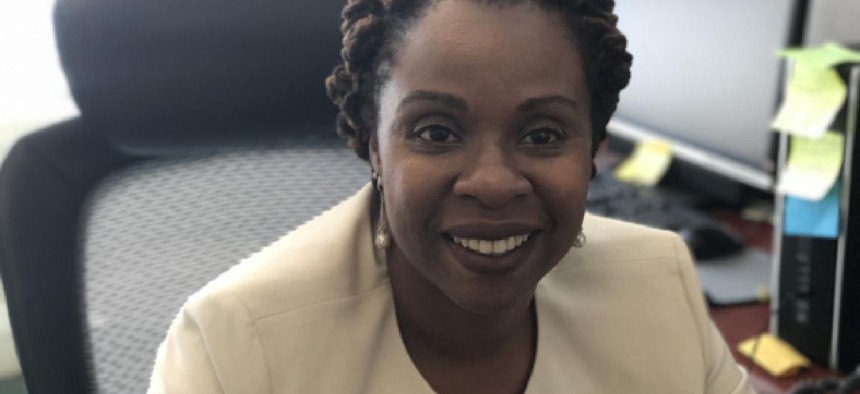Homeless providers look to new DHS administrator for focus

Photo: NYC Department of Homeless Services
Nonprofit providers working with New York City to address the homelessness crisis welcomed the July 10 announcement that Joslyn Carter will lead the Department of Homeless Services. Her appointment fills a role that’s been largely vacant since Commissioner Gilbert Taylor stepped down in December 2015 with an individual who knows the agency well and has skills providers say may help the restructured department fine tune its focus and operations.
Despite a number of new initiatives from the de Blasio administration, the number of unsheltered New Yorkers remains stubbornly high – with the shelter population recently numbering more than 58,000 – a near peak. Also worryingly, the number of people living on the streets has increased by 40 percent over the past year. After a review of the city’s approach to homelessness, Mayor Bill de Blasio in February proposed a “borough-based” approach to opening shelters, with 90 new ones to open across the city over the next five years. By doing so, the de Blasio administration is – somewhat controversially - hoping to locate shelters closer to displaced residents’ support networks, schools and families.
Carter’s role in implementing this approach will be somewhat diminished from that of her predecessor, as de Blasio has wrapped the office into the Department of Social Services under Commissioner Steven Banks - to whom the heads of both DHS and the Human Resources Administration report. As administrator, Carter will handle day-to-day, hands-on management, according to the mayor’s office.
Carter, a 13-year veteran of DHS, served most recently as the Associate Commissioner of Family Intake, which oversees the PATH intake site in the Bronx where families apply for shelter. She has also worked as a social worker in Kings County Hospital, as a director of social services at the American Red Cross, and as director of preventive services at Talbot Services.
“Having dedicated the majority of my working life to the Department of Homeless Services, I’m honored and excited to have the opportunity to help lead the implementation of the mayor’s new borough-based approach at DHS,” Carter said in a statement.
Christine Quinn, the president and CEO of WIN, which houses nearly 10 percent of the city’s homeless families, told New York Nonprofit Media she was happy to see Carter’s experience managing family homelessness - as at one point, homeless families comprised roughly 75 percent of those living in shelters. Shelters oriented for families have special requirements and should be “purpose built” to include playgrounds, counseling rooms and Internet access to do homework and seek jobs, Quinn added. Based on her understanding of Carter’s working style, Carter has been able to balance her agency expertise without being too entrenched to accept input from service providers, Quinn said.
“To quote my staff, she’s somebody you can deal with and someone you can work with, so I don’t have that fear,” she said.
Quinn said she also looked forward to working with Carter to expand services and funding for children affected by the trauma of homelessness: “I think that’s not something that the city has fully embraced in its contracting and other processes with shelter providers.”
Joshua Goldfein, a staff attorney at the Legal Aid Society, told Crain’s that Carter’s appointment shows DHS is not planning to diverge much from its current path. "They've promoted somebody from inside, so that suggests that they're not looking for a wholesale change," he said.
Catherine Trapani, the executive director of Homeless Services United, a group representing shelter and service providers, said it was heartening that DHS promoted from within to lend some stability to the agency, given the changes and new initiatives since the start of the de Blasio administration. She also echoed Quinn’s optimism that Carter’s experience focusing on children and families would help update the agency’s focus.
Trapani said it was still too early to assess whether the realignment of DHS under DSS has been a success - particularly with roles like Carter’s sitting vacant - but found a “certain logic and poetry” in linking the agency with the HRA, which manages rental assistance and other benefits to prevent homelessness.
Trapani said DHS could benefit from having a project manager like Carter to push through changes such as updating the shelter funding model and adding programming to facilities. “This is somebody that can really shepherd through all of the various reforms that are in midstream, because they understand the way the agency functions,” she said.
“The administration has articulated what it wants to accomplish,” she added. “We just need somebody that’s going to get us there.”